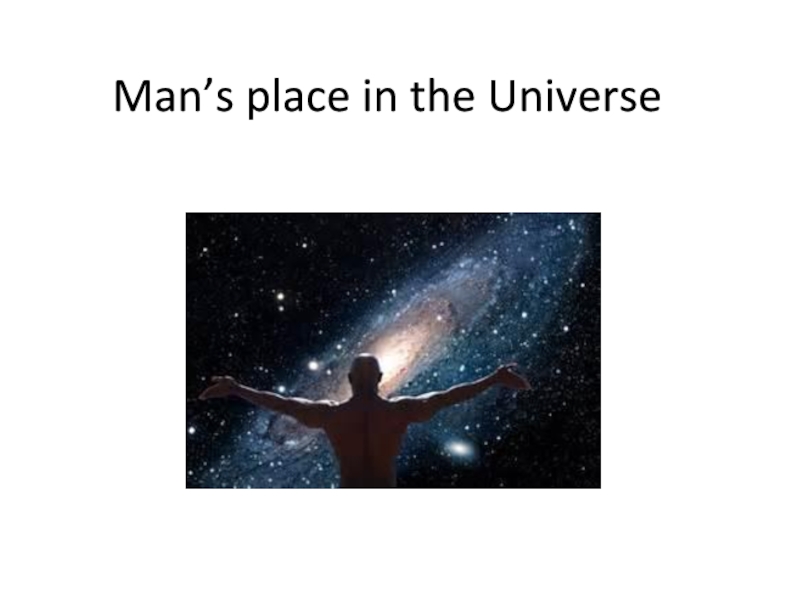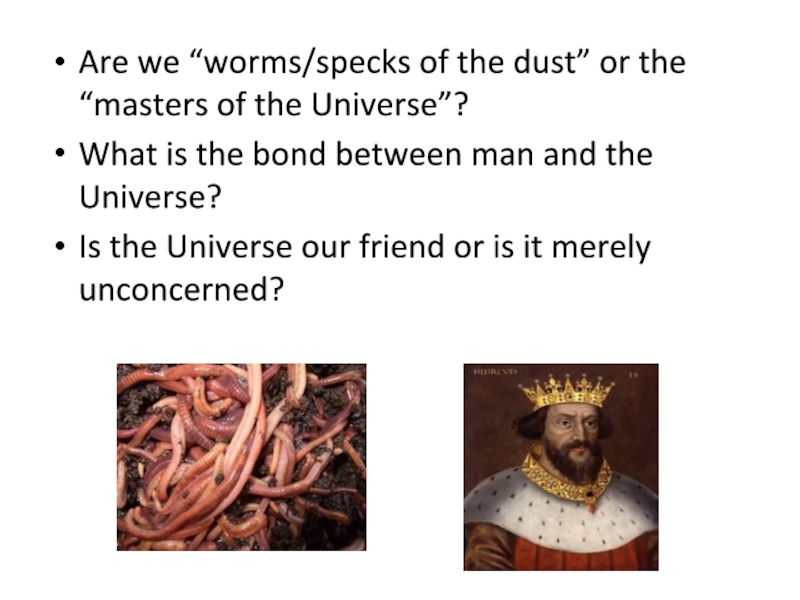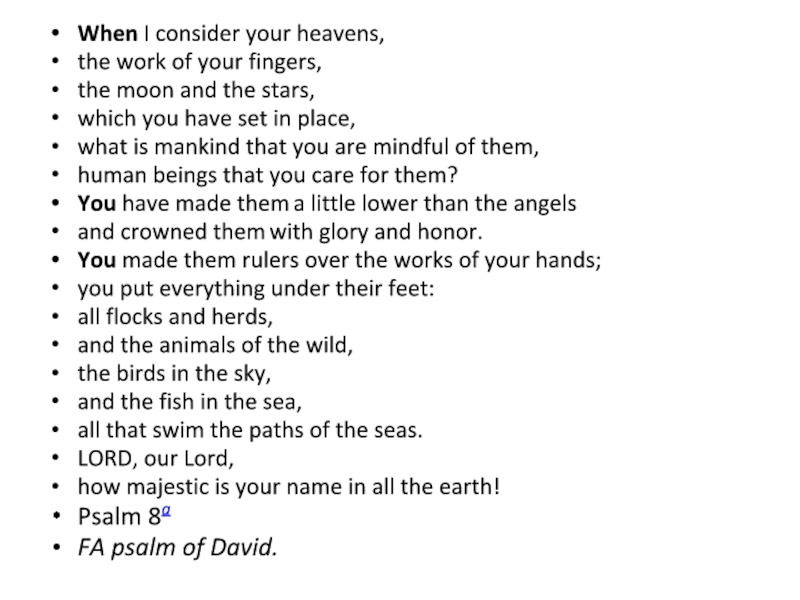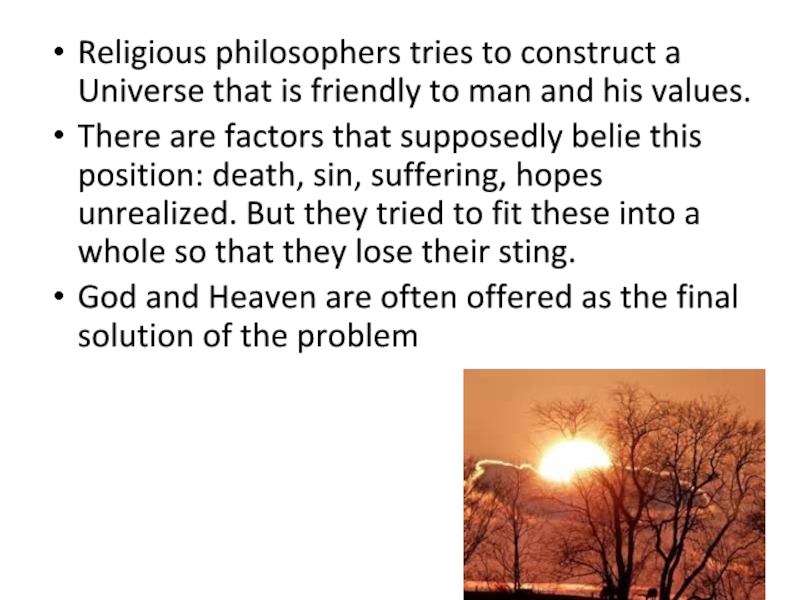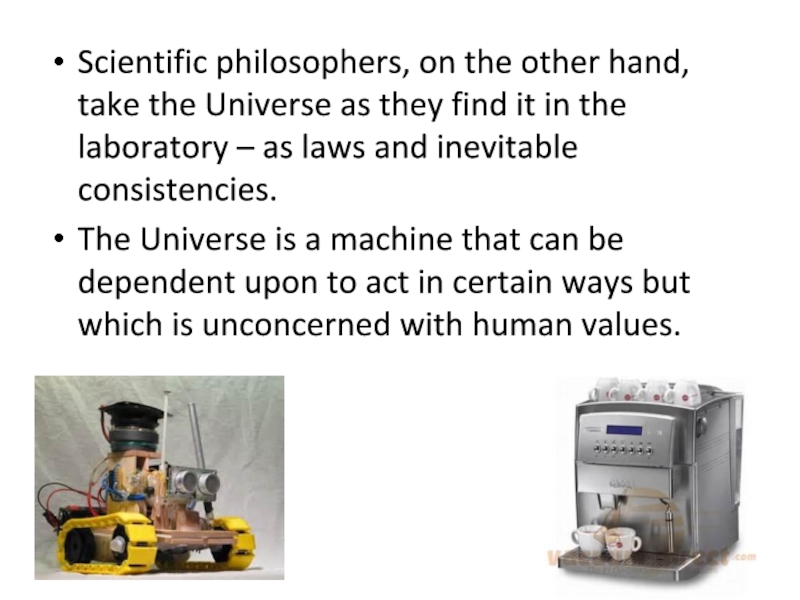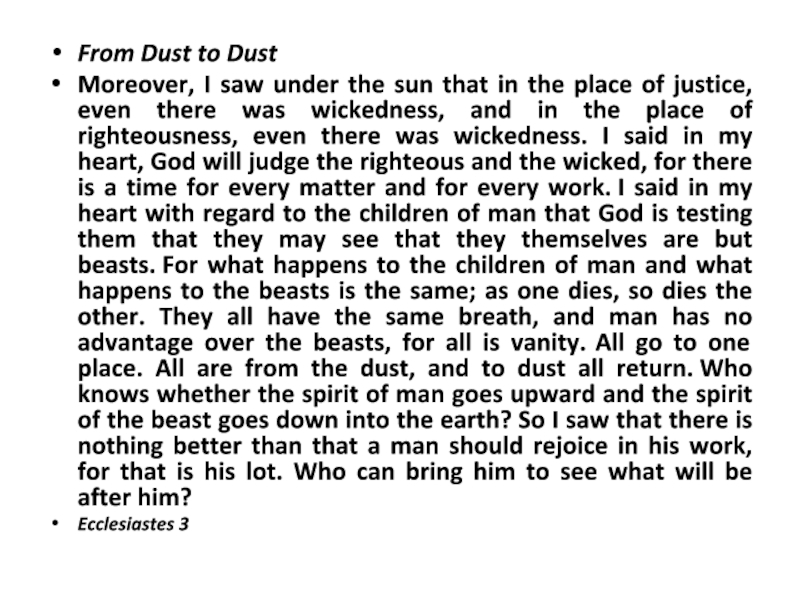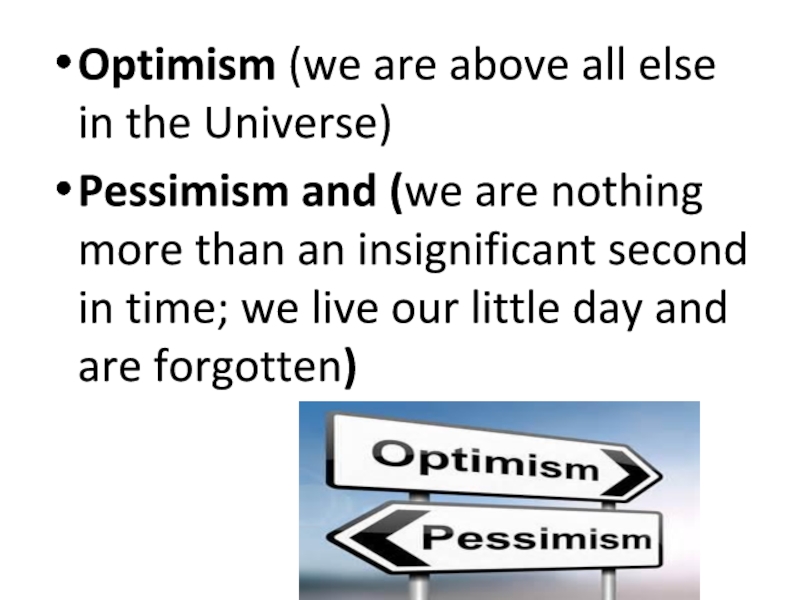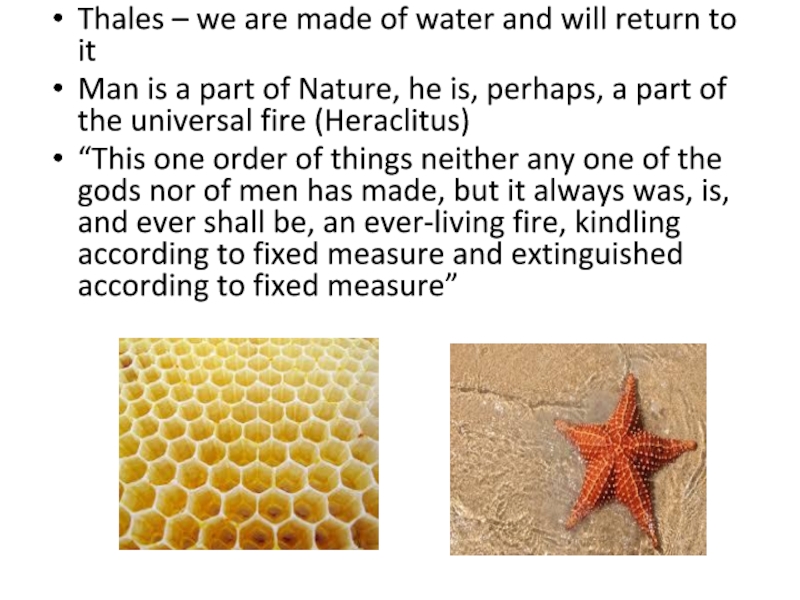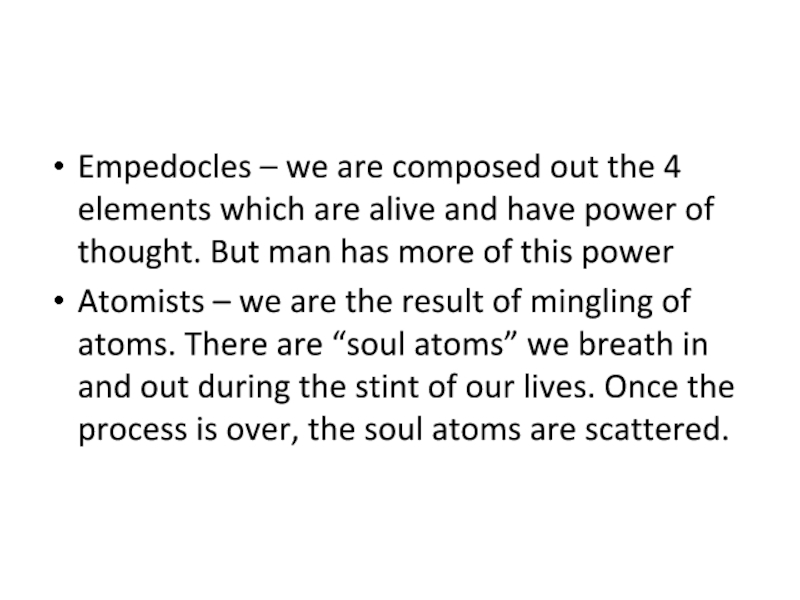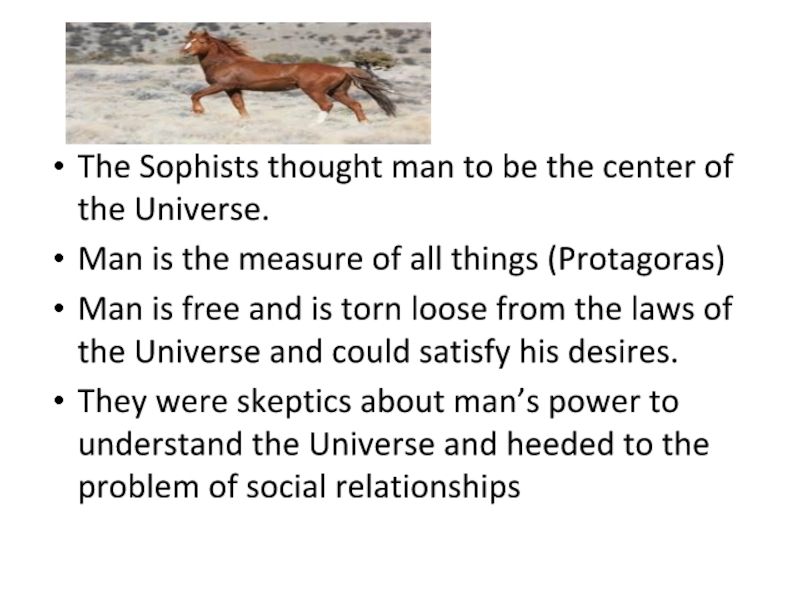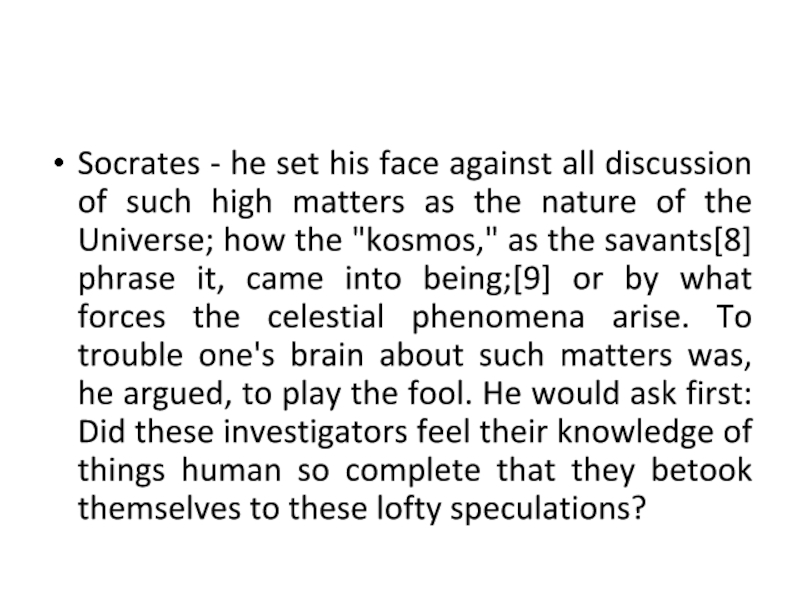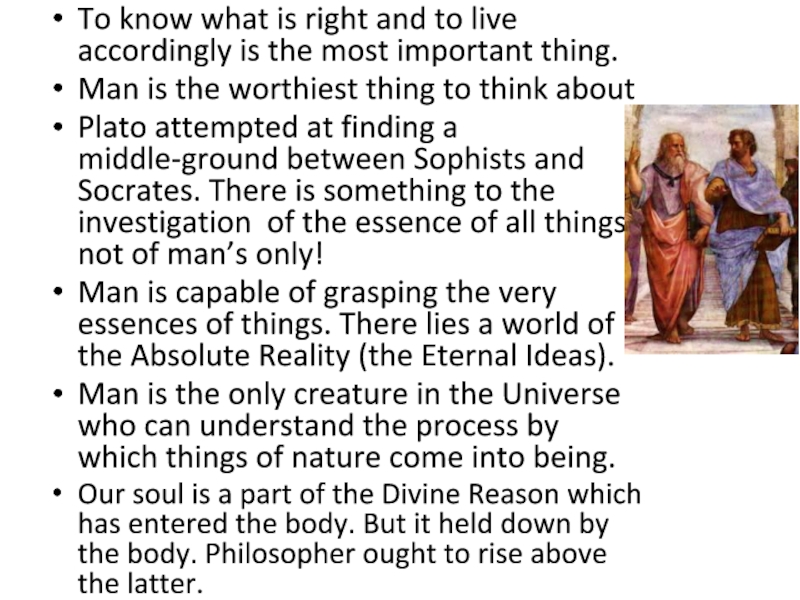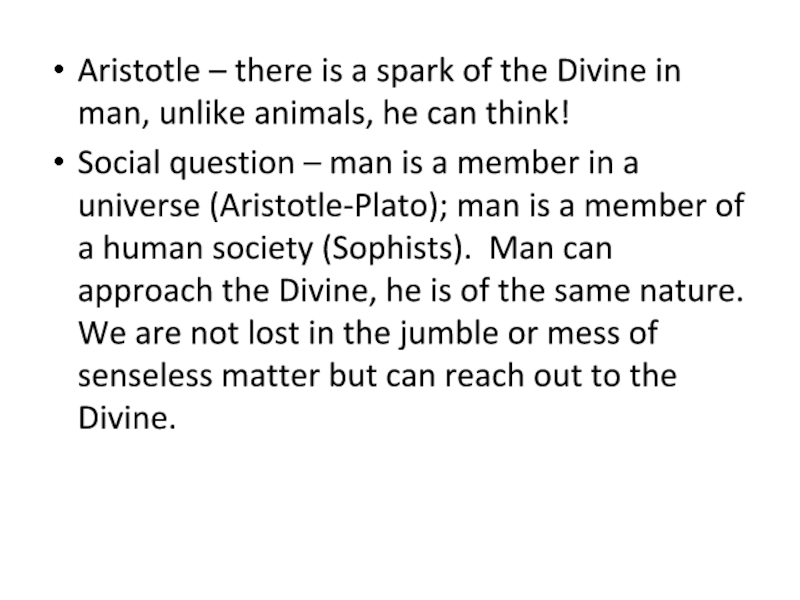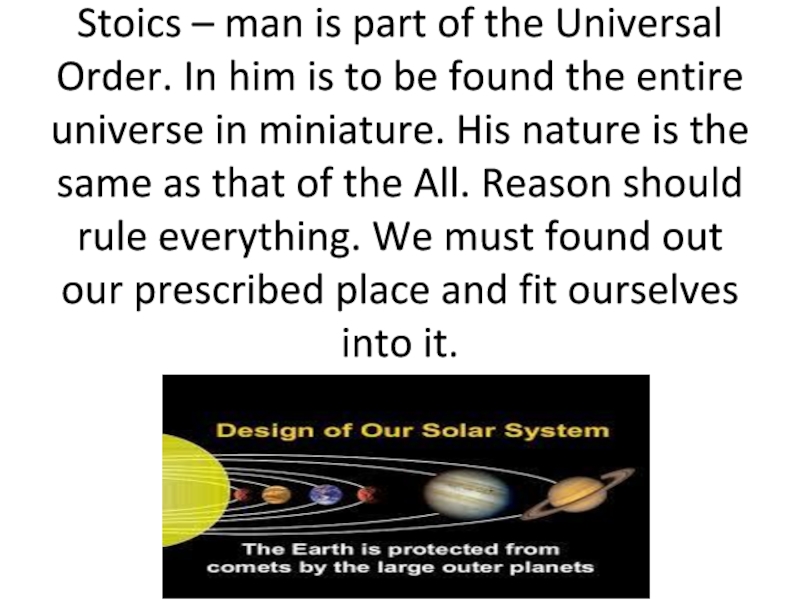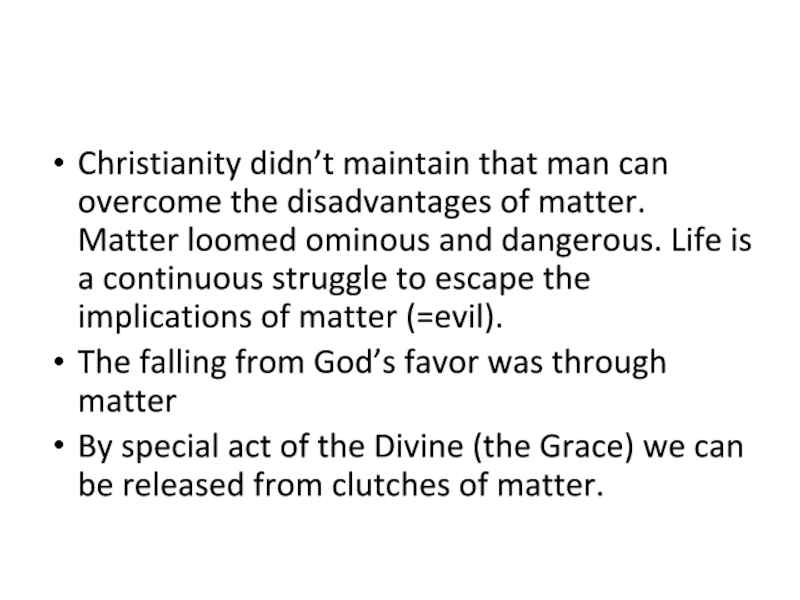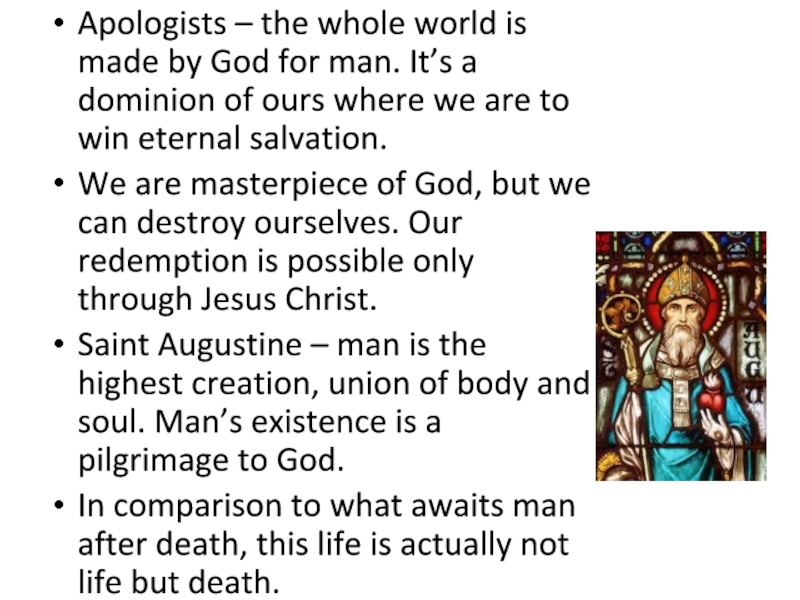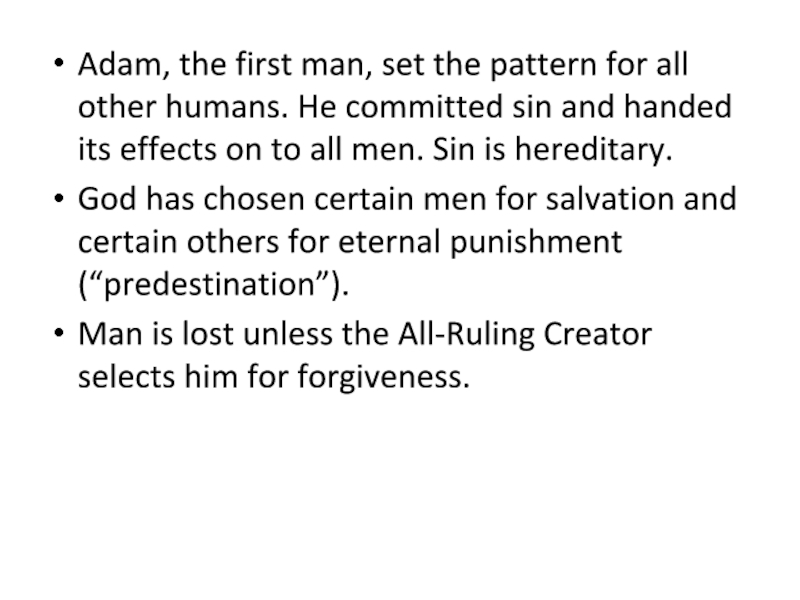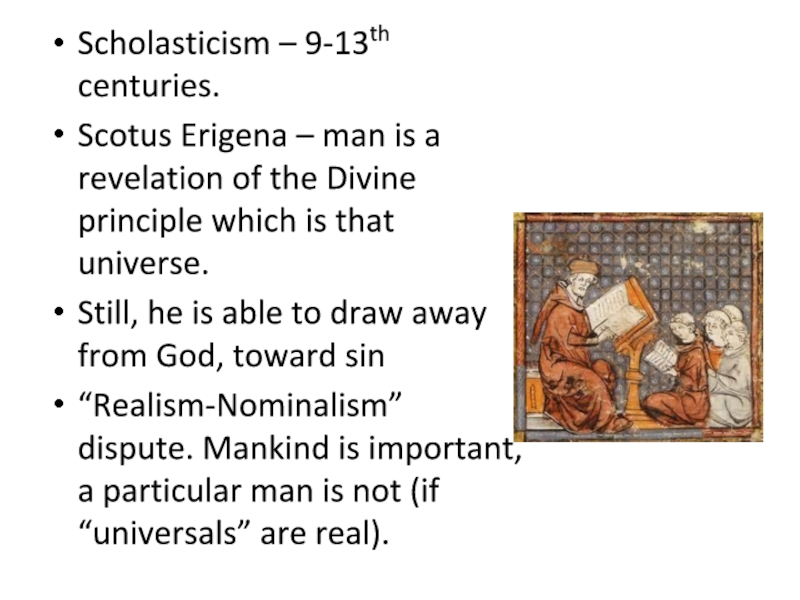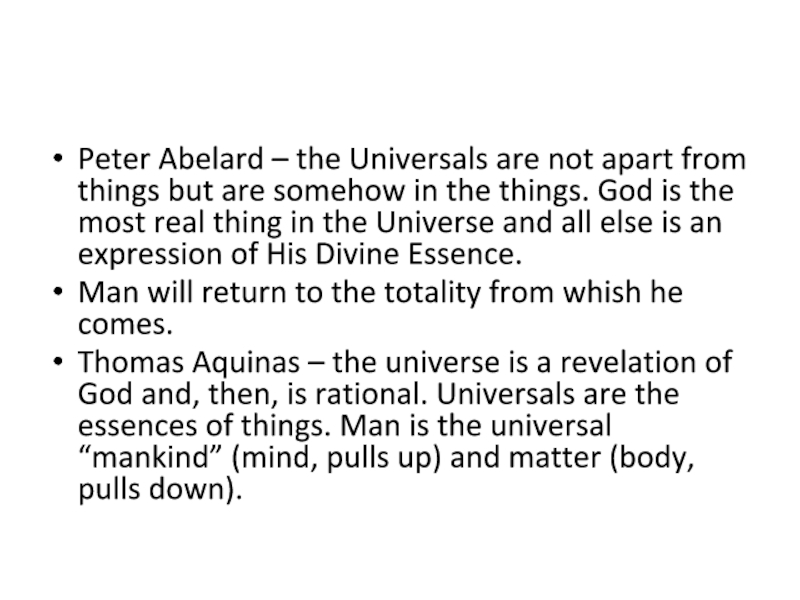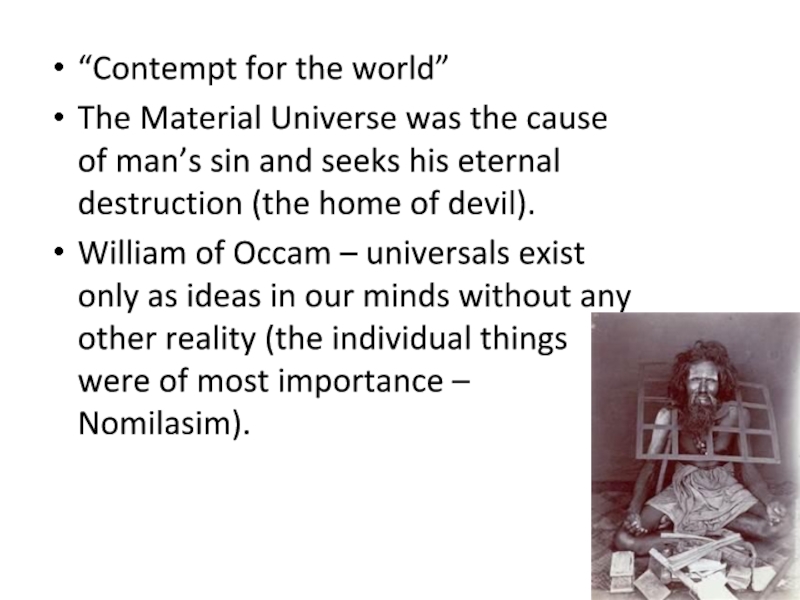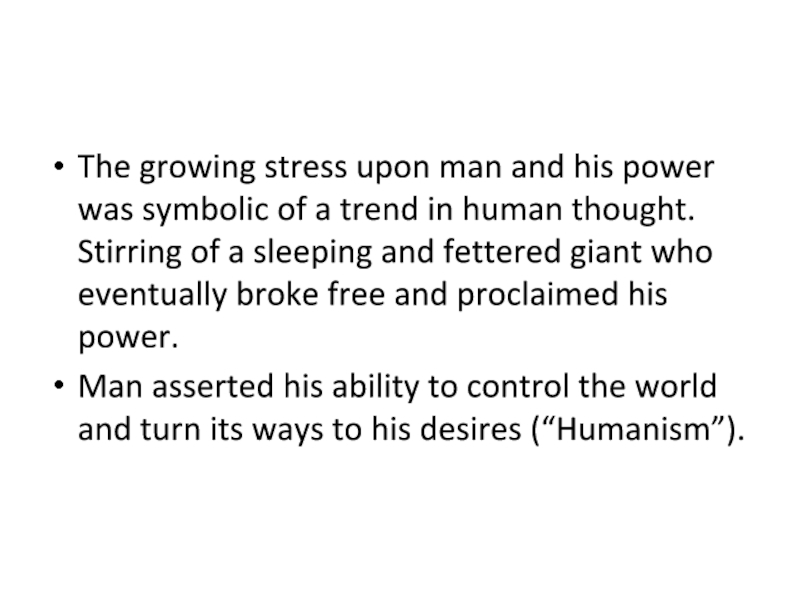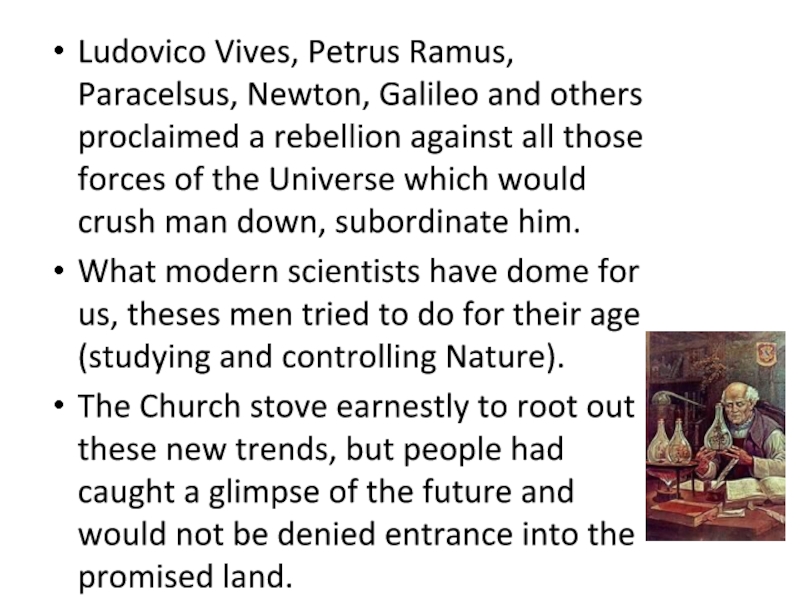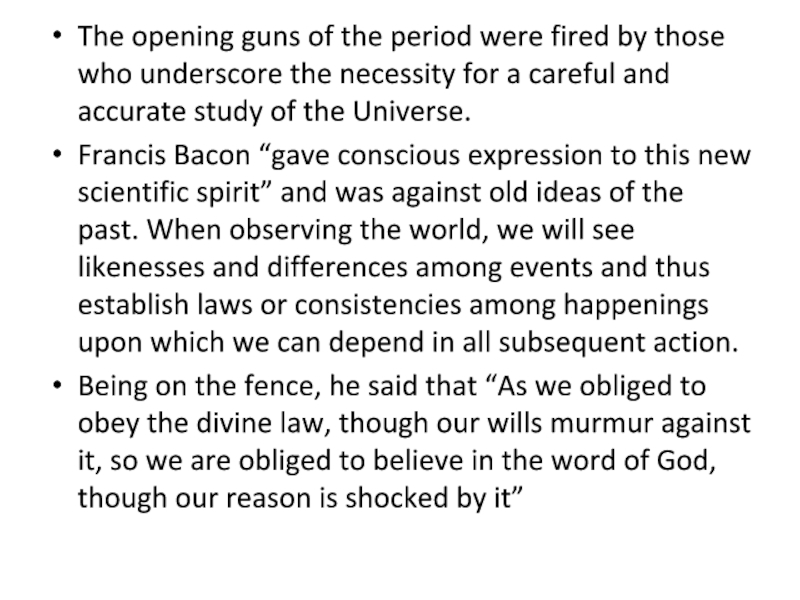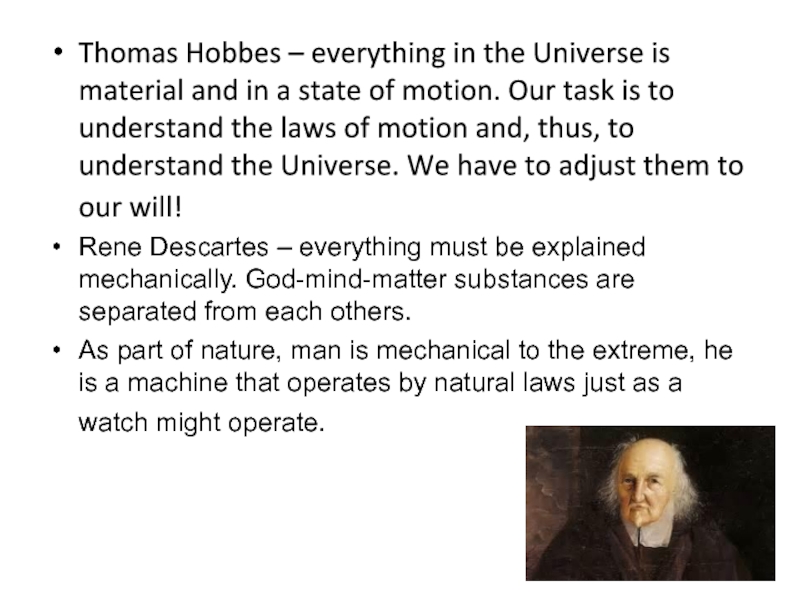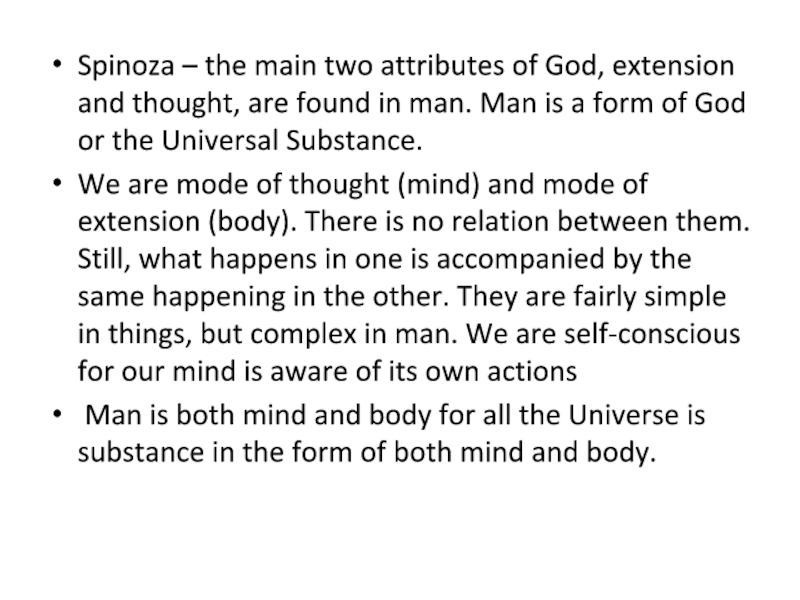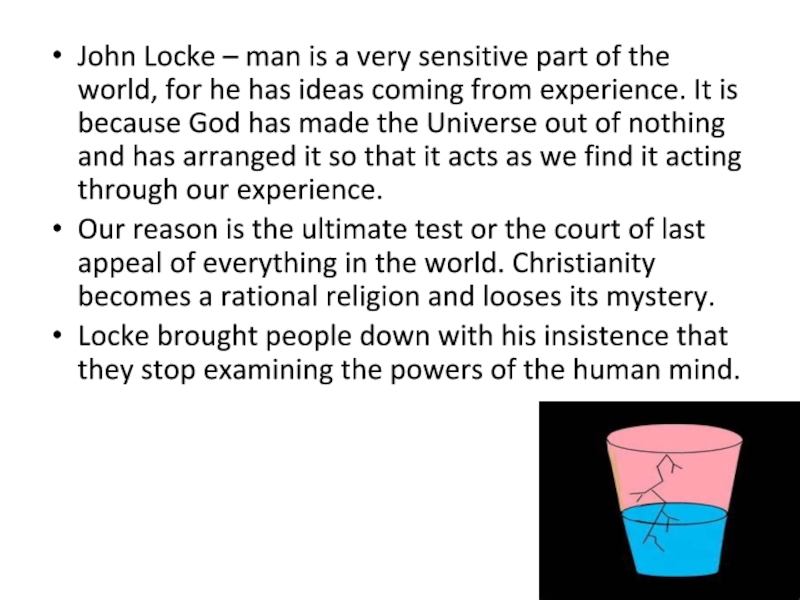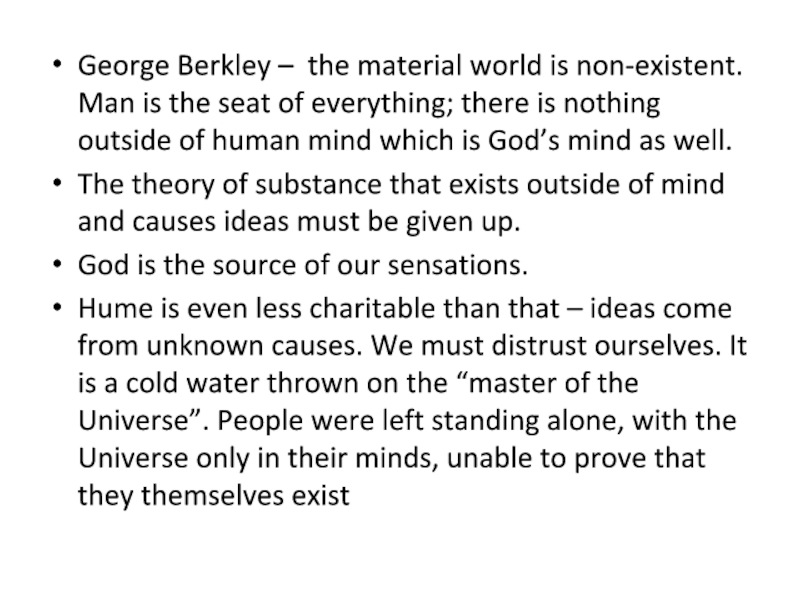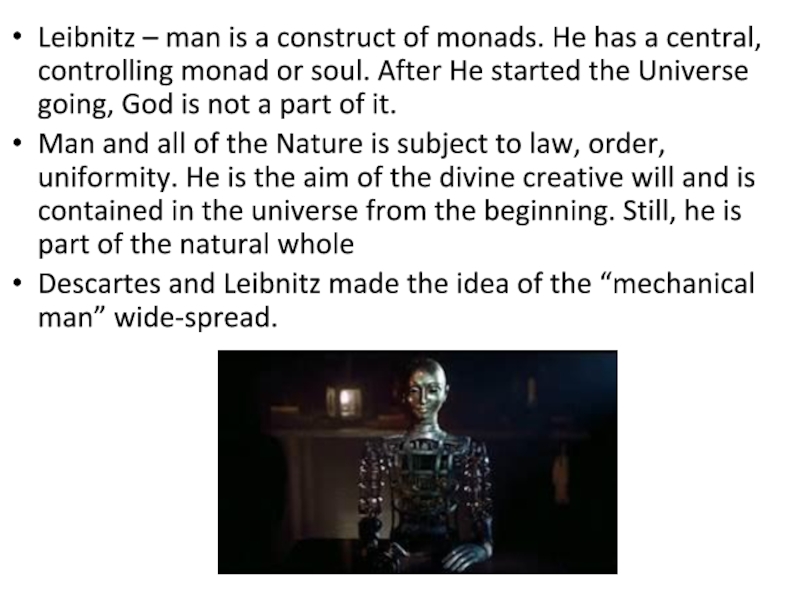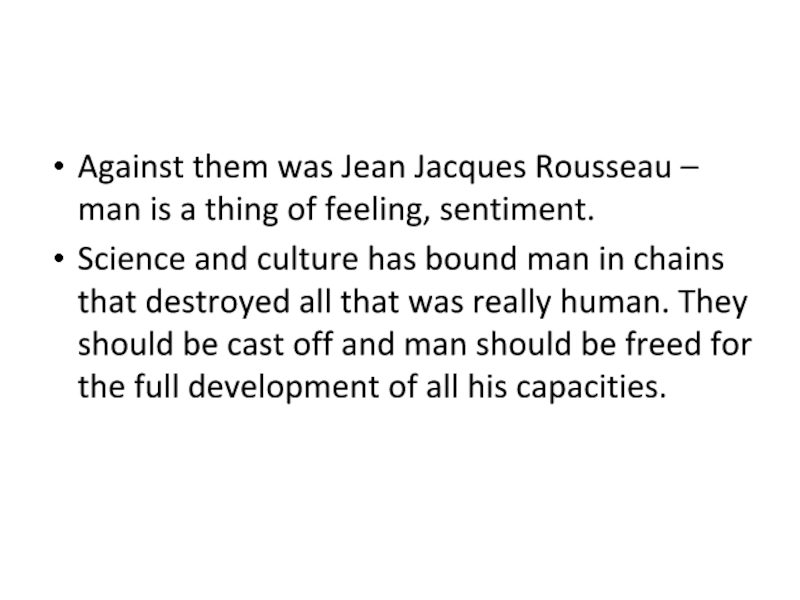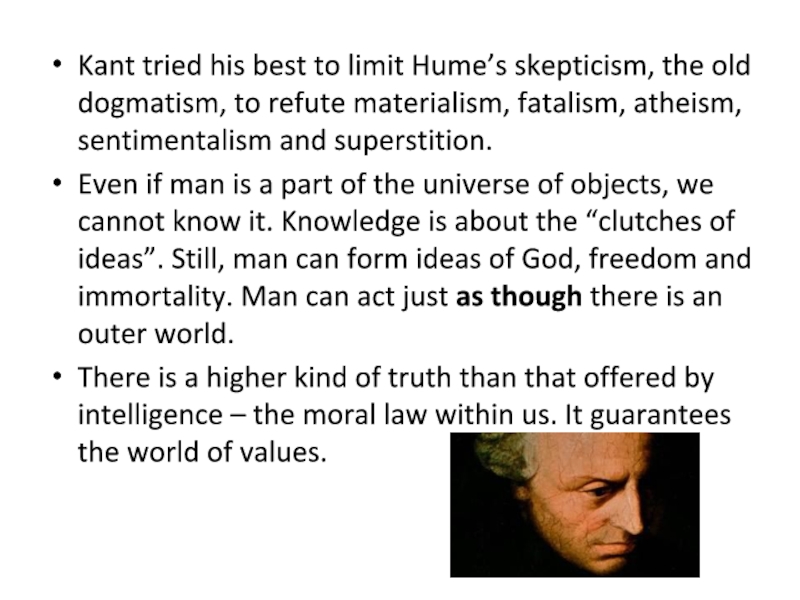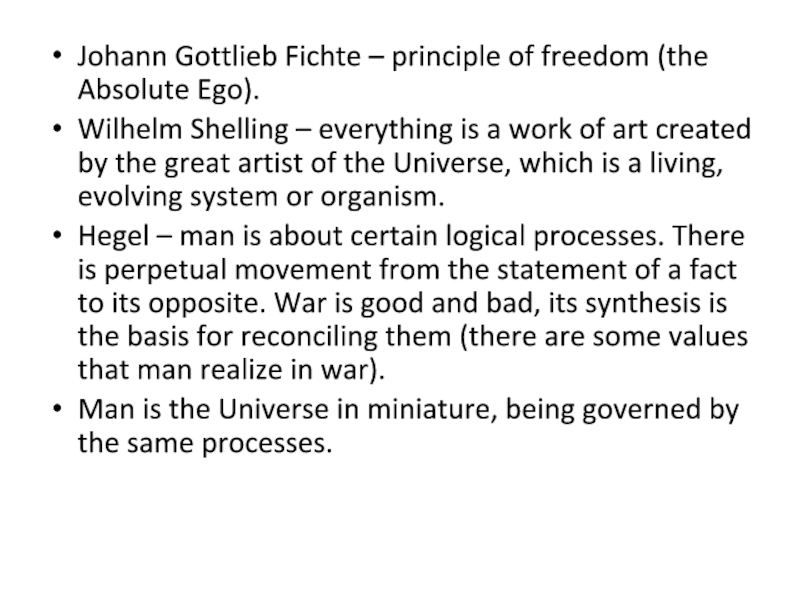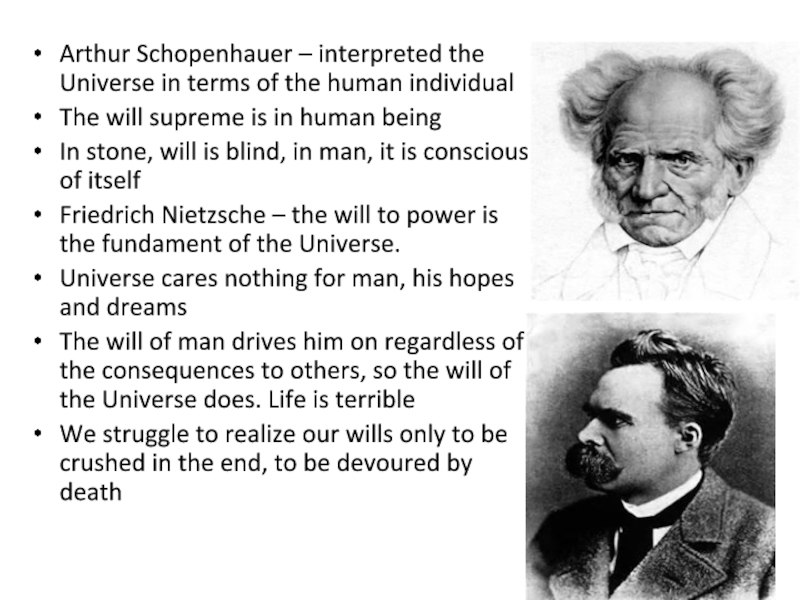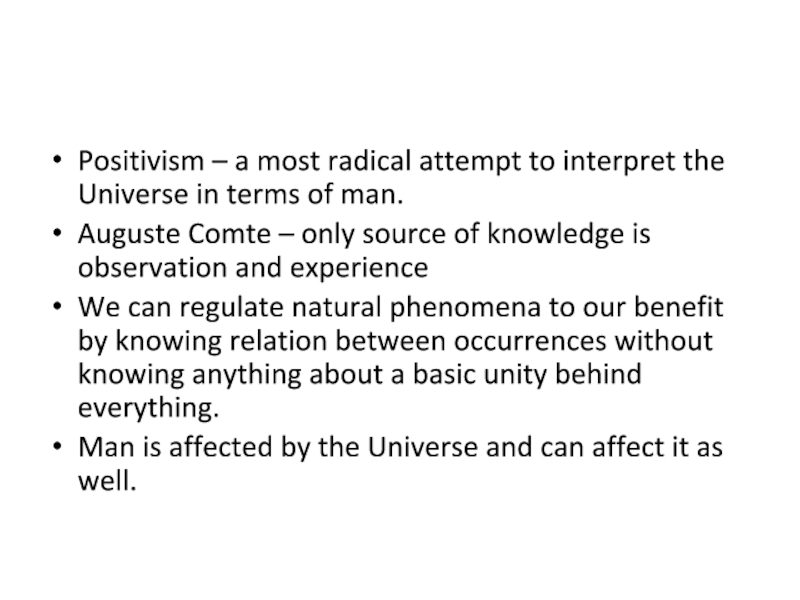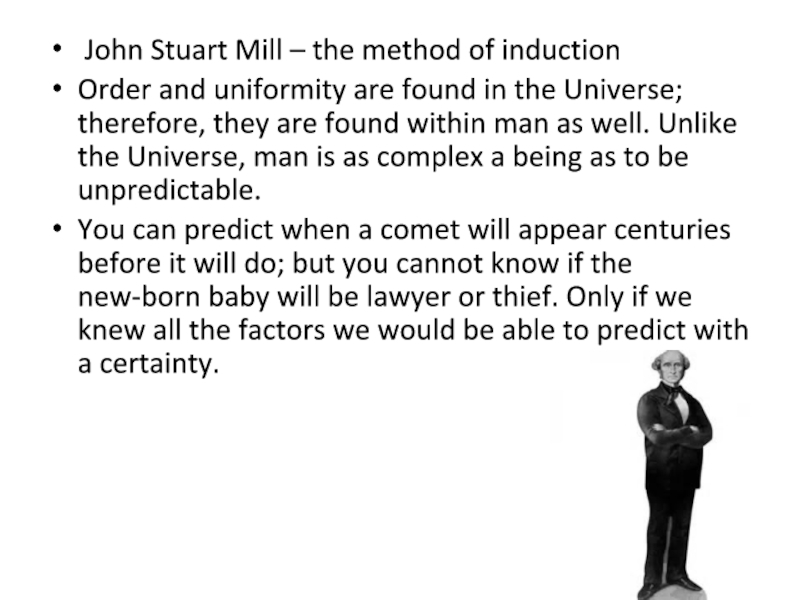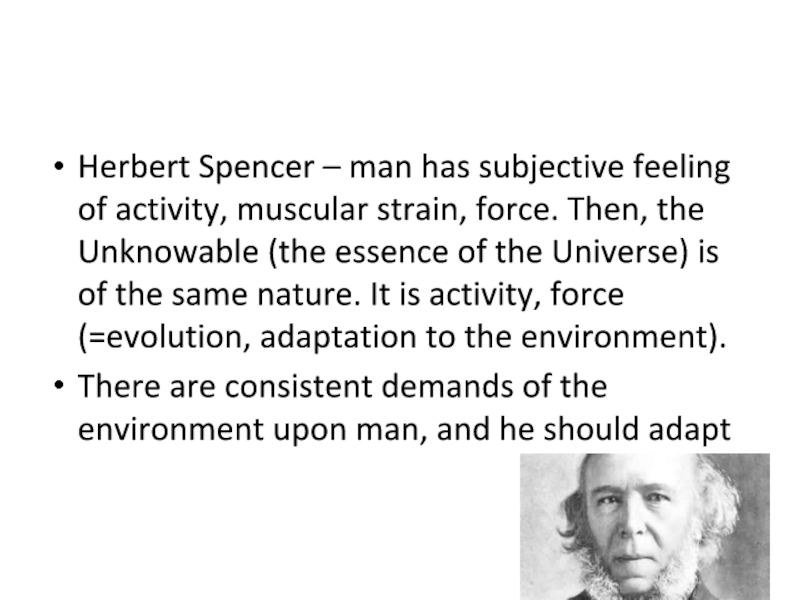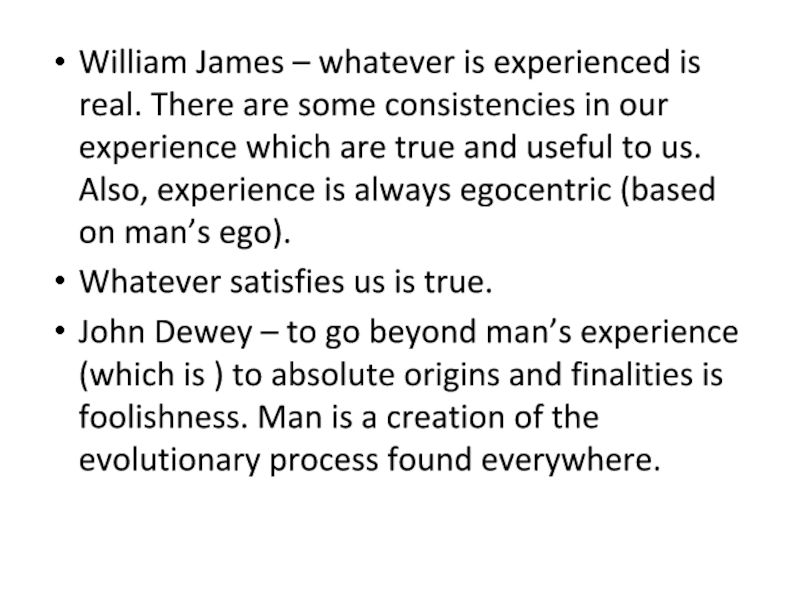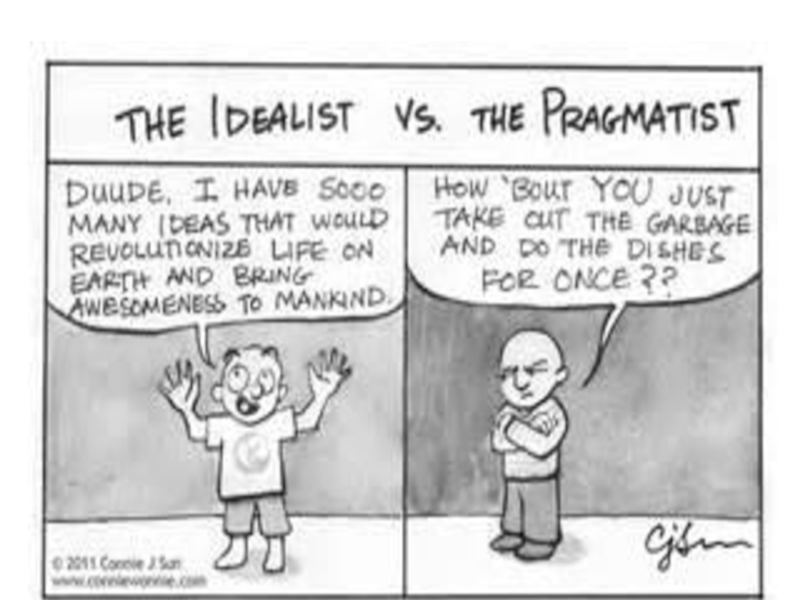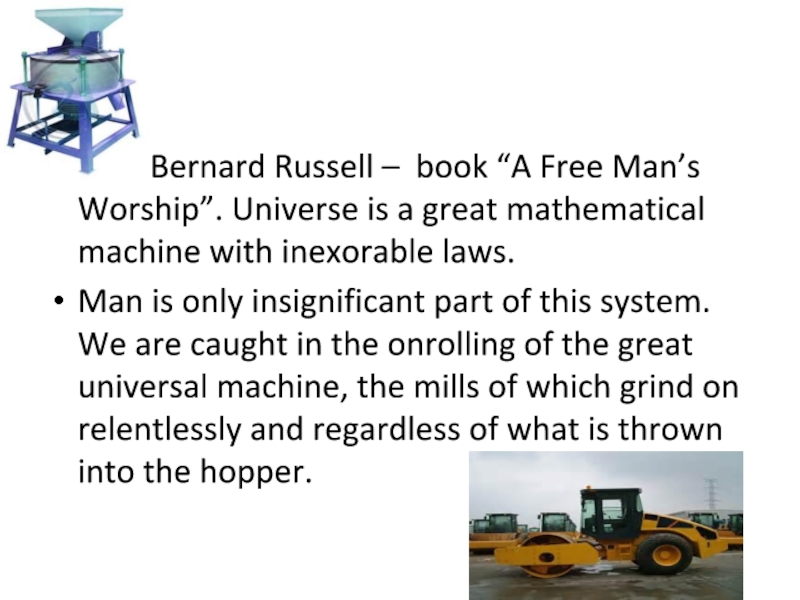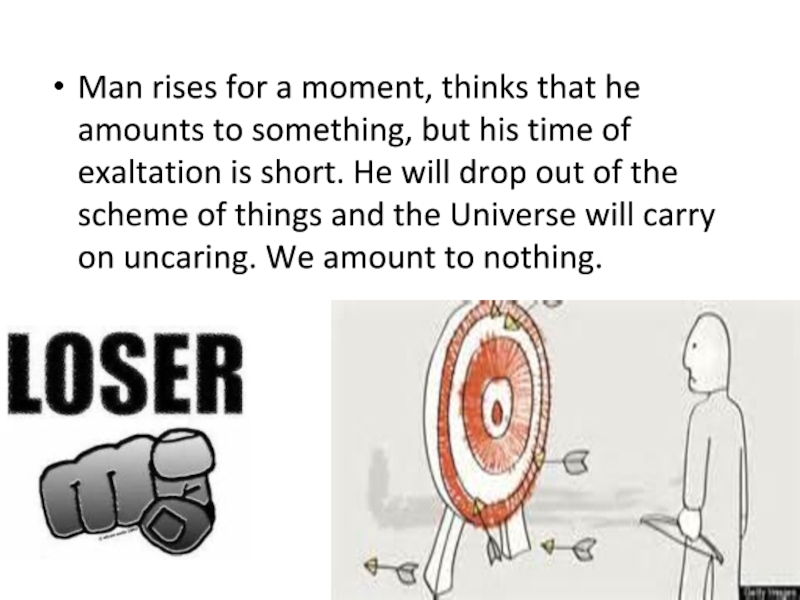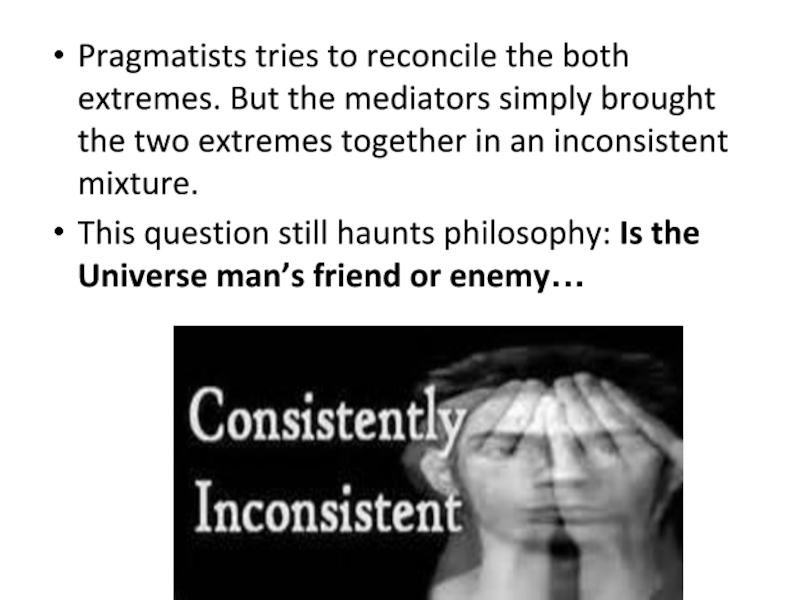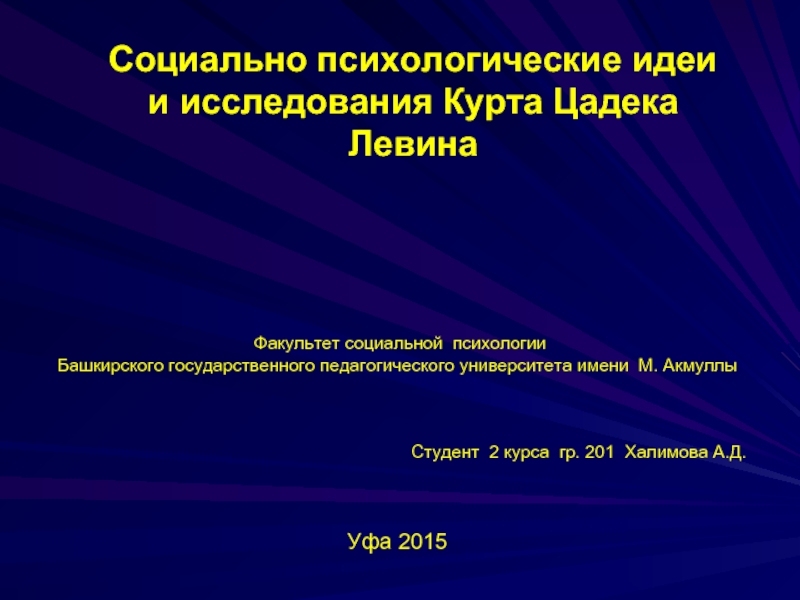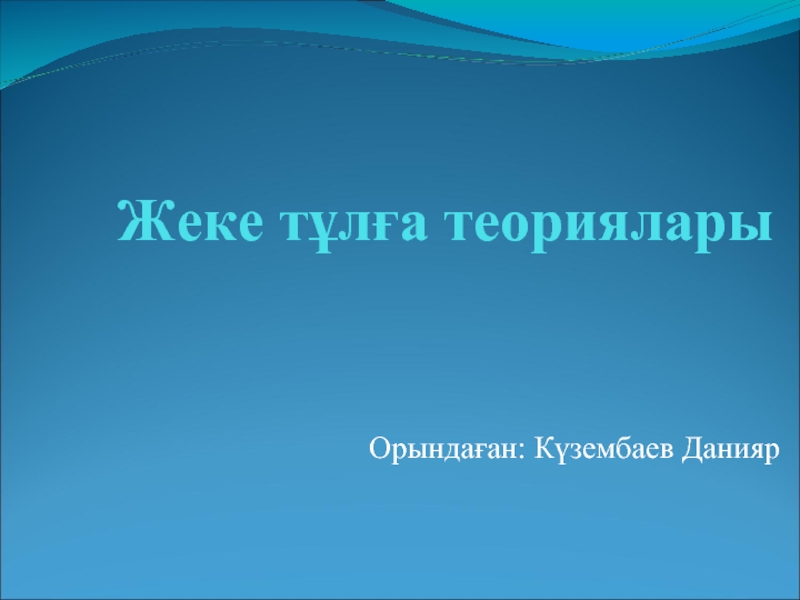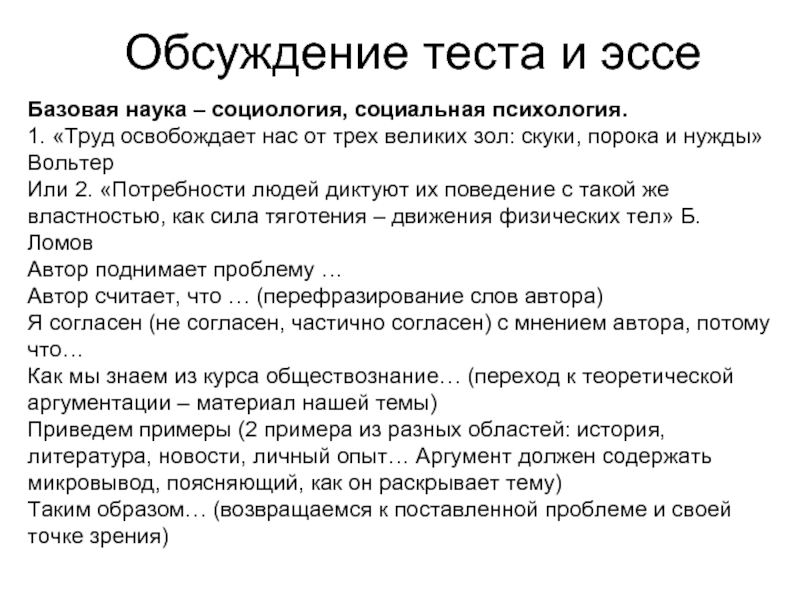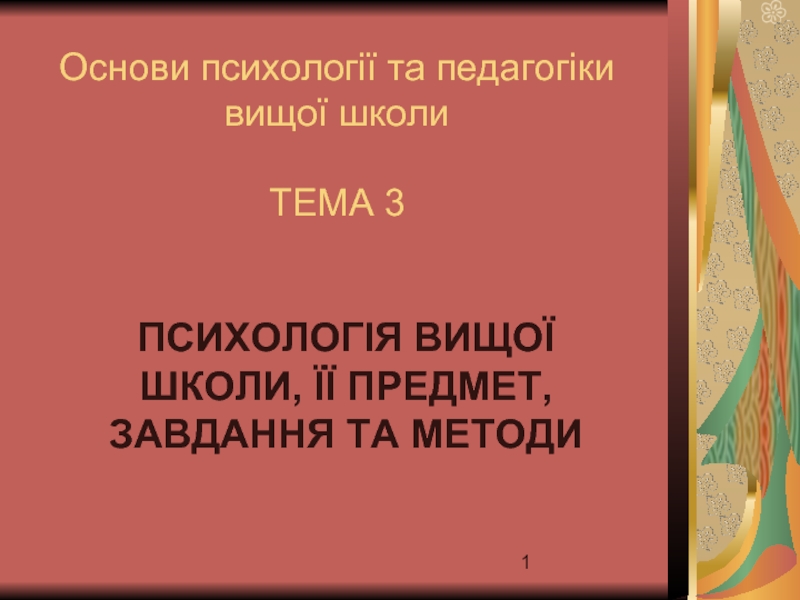- Главная
- Разное
- Дизайн
- Бизнес и предпринимательство
- Аналитика
- Образование
- Развлечения
- Красота и здоровье
- Финансы
- Государство
- Путешествия
- Спорт
- Недвижимость
- Армия
- Графика
- Культурология
- Еда и кулинария
- Лингвистика
- Английский язык
- Астрономия
- Алгебра
- Биология
- География
- Детские презентации
- Информатика
- История
- Литература
- Маркетинг
- Математика
- Медицина
- Менеджмент
- Музыка
- МХК
- Немецкий язык
- ОБЖ
- Обществознание
- Окружающий мир
- Педагогика
- Русский язык
- Технология
- Физика
- Философия
- Химия
- Шаблоны, картинки для презентаций
- Экология
- Экономика
- Юриспруденция
Man’s place in the Universe презентация
Содержание
- 1. Man’s place in the Universe
- 2. Are we “worms/specks of the dust”
- 3. When I consider your heavens, the
- 4. Religious philosophers tries to construct a
- 5. Scientific philosophers, on the other hand,
- 6. From Dust to Dust Moreover, I
- 7. Optimism (we are above all else
- 8. Thales – we are made of
- 9. Empedocles – we are composed out
- 10. The Sophists thought man to be
- 11. Socrates - he set his face
- 12. To know what is right and
- 13. Aristotle – there is a spark
- 14. Stoics – man
- 15. Christianity didn’t maintain that man can
- 16. Apologists – the whole world is
- 17. Adam, the first man, set the
- 18. Scholasticism – 9-13th centuries. Scotus
- 19. Peter Abelard – the Universals are
- 20. “Contempt for the world” The Material
- 21. The growing stress upon man and
- 22. Ludovico Vives, Petrus Ramus, Paracelsus, Newton,
- 23. The opening guns of the period
- 24. Thomas Hobbes – everything in the
- 25. Spinoza – the main two attributes
- 26. John Locke – man is a
- 27. George Berkley – the material world
- 28. Leibnitz – man is a construct
- 29. Against them was Jean Jacques Rousseau
- 30. Kant tried his best to limit
- 31. Johann Gottlieb Fichte – principle of
- 32. Arthur Schopenhauer – interpreted the Universe
- 33. Positivism – a most radical attempt
- 34. John Stuart Mill – the
- 35. Herbert Spencer – man has subjective
- 36. William James – whatever is experienced
- 38. Bernard
- 39. Man rises for a moment, thinks
- 40. Pragmatists tries to reconcile the both
Слайд 2
Are we “worms/specks of the dust” or the “masters of the
Universe”?
What is the bond between man and the Universe?
Is the Universe our friend or is it merely unconcerned?
What is the bond between man and the Universe?
Is the Universe our friend or is it merely unconcerned?
Слайд 3
When I consider your heavens,
the work of your fingers,
the moon and
the stars,
which you have set in place,
what is mankind that you are mindful of them,
human beings that you care for them?
You have made them a little lower than the angels
and crowned them with glory and honor.
You made them rulers over the works of your hands;
you put everything under their feet:
all flocks and herds,
and the animals of the wild,
the birds in the sky,
and the fish in the sea,
all that swim the paths of the seas.
LORD, our Lord,
how majestic is your name in all the earth!
Psalm 8a
FA psalm of David.
which you have set in place,
what is mankind that you are mindful of them,
human beings that you care for them?
You have made them a little lower than the angels
and crowned them with glory and honor.
You made them rulers over the works of your hands;
you put everything under their feet:
all flocks and herds,
and the animals of the wild,
the birds in the sky,
and the fish in the sea,
all that swim the paths of the seas.
LORD, our Lord,
how majestic is your name in all the earth!
Psalm 8a
FA psalm of David.
Слайд 4
Religious philosophers tries to construct a Universe that is friendly to
man and his values.
There are factors that supposedly belie this position: death, sin, suffering, hopes unrealized. But they tried to fit these into a whole so that they lose their sting.
God and Heaven are often offered as the final solution of the problem
There are factors that supposedly belie this position: death, sin, suffering, hopes unrealized. But they tried to fit these into a whole so that they lose their sting.
God and Heaven are often offered as the final solution of the problem
Слайд 5
Scientific philosophers, on the other hand, take the Universe as they
find it in the laboratory – as laws and inevitable consistencies.
The Universe is a machine that can be dependent upon to act in certain ways but which is unconcerned with human values.
The Universe is a machine that can be dependent upon to act in certain ways but which is unconcerned with human values.
Слайд 6
From Dust to Dust
Moreover, I saw under the sun that in
the place of justice, even there was wickedness, and in the place of righteousness, even there was wickedness. I said in my heart, God will judge the righteous and the wicked, for there is a time for every matter and for every work. I said in my heart with regard to the children of man that God is testing them that they may see that they themselves are but beasts. For what happens to the children of man and what happens to the beasts is the same; as one dies, so dies the other. They all have the same breath, and man has no advantage over the beasts, for all is vanity. All go to one place. All are from the dust, and to dust all return. Who knows whether the spirit of man goes upward and the spirit of the beast goes down into the earth? So I saw that there is nothing better than that a man should rejoice in his work, for that is his lot. Who can bring him to see what will be after him?
Ecclesiastes 3
Ecclesiastes 3
Слайд 7
Optimism (we are above all else in the Universe)
Pessimism and
(we are nothing more than an insignificant second in time; we live our little day and are forgotten)
Слайд 8
Thales – we are made of water and will return to
it
Man is a part of Nature, he is, perhaps, a part of the universal fire (Heraclitus)
“This one order of things neither any one of the gods nor of men has made, but it always was, is, and ever shall be, an ever-living fire, kindling according to fixed measure and extinguished according to fixed measure”
Man is a part of Nature, he is, perhaps, a part of the universal fire (Heraclitus)
“This one order of things neither any one of the gods nor of men has made, but it always was, is, and ever shall be, an ever-living fire, kindling according to fixed measure and extinguished according to fixed measure”
Слайд 9
Empedocles – we are composed out the 4 elements which are
alive and have power of thought. But man has more of this power
Atomists – we are the result of mingling of atoms. There are “soul atoms” we breath in and out during the stint of our lives. Once the process is over, the soul atoms are scattered.
Atomists – we are the result of mingling of atoms. There are “soul atoms” we breath in and out during the stint of our lives. Once the process is over, the soul atoms are scattered.
Слайд 10
The Sophists thought man to be the center of the Universe.
Man is the measure of all things (Protagoras)
Man is free and is torn loose from the laws of the Universe and could satisfy his desires.
They were skeptics about man’s power to understand the Universe and heeded to the problem of social relationships
Слайд 11
Socrates - he set his face against all discussion of such
high matters as the nature of the Universe; how the "kosmos," as the savants[8] phrase it, came into being;[9] or by what forces the celestial phenomena arise. To trouble one's brain about such matters was, he argued, to play the fool. He would ask first: Did these investigators feel their knowledge of things human so complete that they betook themselves to these lofty speculations?
Слайд 12
To know what is right and to live accordingly is the
most important thing.
Man is the worthiest thing to think about
Plato attempted at finding a middle-ground between Sophists and Socrates. There is something to the investigation of the essence of all things, not of man’s only!
Man is capable of grasping the very essences of things. There lies a world of the Absolute Reality (the Eternal Ideas).
Man is the only creature in the Universe who can understand the process by which things of nature come into being.
Our soul is a part of the Divine Reason which has entered the body. But it held down by the body. Philosopher ought to rise above the latter.
Man is the worthiest thing to think about
Plato attempted at finding a middle-ground between Sophists and Socrates. There is something to the investigation of the essence of all things, not of man’s only!
Man is capable of grasping the very essences of things. There lies a world of the Absolute Reality (the Eternal Ideas).
Man is the only creature in the Universe who can understand the process by which things of nature come into being.
Our soul is a part of the Divine Reason which has entered the body. But it held down by the body. Philosopher ought to rise above the latter.
Слайд 13
Aristotle – there is a spark of the Divine in man,
unlike animals, he can think!
Social question – man is a member in a universe (Aristotle-Plato); man is a member of a human society (Sophists). Man can approach the Divine, he is of the same nature. We are not lost in the jumble or mess of senseless matter but can reach out to the Divine.
Social question – man is a member in a universe (Aristotle-Plato); man is a member of a human society (Sophists). Man can approach the Divine, he is of the same nature. We are not lost in the jumble or mess of senseless matter but can reach out to the Divine.
Слайд 14 Stoics – man is part of the Universal Order. In him
is to be found the entire universe in miniature. His nature is the same as that of the All. Reason should rule everything. We must found out our prescribed place and fit ourselves into it.
Слайд 15
Christianity didn’t maintain that man can overcome the disadvantages of matter.
Matter loomed ominous and dangerous. Life is a continuous struggle to escape the implications of matter (=evil).
The falling from God’s favor was through matter
By special act of the Divine (the Grace) we can be released from clutches of matter.
The falling from God’s favor was through matter
By special act of the Divine (the Grace) we can be released from clutches of matter.
Слайд 16
Apologists – the whole world is made by God for man.
It’s a dominion of ours where we are to win eternal salvation.
We are masterpiece of God, but we can destroy ourselves. Our redemption is possible only through Jesus Christ.
Saint Augustine – man is the highest creation, union of body and soul. Man’s existence is a pilgrimage to God.
In comparison to what awaits man after death, this life is actually not life but death.
We are masterpiece of God, but we can destroy ourselves. Our redemption is possible only through Jesus Christ.
Saint Augustine – man is the highest creation, union of body and soul. Man’s existence is a pilgrimage to God.
In comparison to what awaits man after death, this life is actually not life but death.
Слайд 17
Adam, the first man, set the pattern for all other humans.
He committed sin and handed its effects on to all men. Sin is hereditary.
God has chosen certain men for salvation and certain others for eternal punishment (“predestination”).
Man is lost unless the All-Ruling Creator selects him for forgiveness.
God has chosen certain men for salvation and certain others for eternal punishment (“predestination”).
Man is lost unless the All-Ruling Creator selects him for forgiveness.
Слайд 18
Scholasticism – 9-13th centuries.
Scotus Erigena – man is a revelation
of the Divine principle which is that universe.
Still, he is able to draw away from God, toward sin
“Realism-Nominalism” dispute. Mankind is important, a particular man is not (if “universals” are real).
Still, he is able to draw away from God, toward sin
“Realism-Nominalism” dispute. Mankind is important, a particular man is not (if “universals” are real).
Слайд 19
Peter Abelard – the Universals are not apart from things but
are somehow in the things. God is the most real thing in the Universe and all else is an expression of His Divine Essence.
Man will return to the totality from whish he comes.
Thomas Aquinas – the universe is a revelation of God and, then, is rational. Universals are the essences of things. Man is the universal “mankind” (mind, pulls up) and matter (body, pulls down).
Man will return to the totality from whish he comes.
Thomas Aquinas – the universe is a revelation of God and, then, is rational. Universals are the essences of things. Man is the universal “mankind” (mind, pulls up) and matter (body, pulls down).
Слайд 20
“Contempt for the world”
The Material Universe was the cause of man’s
sin and seeks his eternal destruction (the home of devil).
William of Occam – universals exist only as ideas in our minds without any other reality (the individual things were of most importance – Nomilasim).
William of Occam – universals exist only as ideas in our minds without any other reality (the individual things were of most importance – Nomilasim).
Слайд 21
The growing stress upon man and his power was symbolic of
a trend in human thought. Stirring of a sleeping and fettered giant who eventually broke free and proclaimed his power.
Man asserted his ability to control the world and turn its ways to his desires (“Humanism”).
Man asserted his ability to control the world and turn its ways to his desires (“Humanism”).
Слайд 22
Ludovico Vives, Petrus Ramus, Paracelsus, Newton, Galileo and others proclaimed a
rebellion against all those forces of the Universe which would crush man down, subordinate him.
What modern scientists have dome for us, theses men tried to do for their age (studying and controlling Nature).
The Church stove earnestly to root out these new trends, but people had caught a glimpse of the future and would not be denied entrance into the promised land.
What modern scientists have dome for us, theses men tried to do for their age (studying and controlling Nature).
The Church stove earnestly to root out these new trends, but people had caught a glimpse of the future and would not be denied entrance into the promised land.
Слайд 23
The opening guns of the period were fired by those who
underscore the necessity for a careful and accurate study of the Universe.
Francis Bacon “gave conscious expression to this new scientific spirit” and was against old ideas of the past. When observing the world, we will see likenesses and differences among events and thus establish laws or consistencies among happenings upon which we can depend in all subsequent action.
Being on the fence, he said that “As we obliged to obey the divine law, though our wills murmur against it, so we are obliged to believe in the word of God, though our reason is shocked by it”
Francis Bacon “gave conscious expression to this new scientific spirit” and was against old ideas of the past. When observing the world, we will see likenesses and differences among events and thus establish laws or consistencies among happenings upon which we can depend in all subsequent action.
Being on the fence, he said that “As we obliged to obey the divine law, though our wills murmur against it, so we are obliged to believe in the word of God, though our reason is shocked by it”
Слайд 24
Thomas Hobbes – everything in the Universe is material and in
a state of motion. Our task is to understand the laws of motion and, thus, to understand the Universe. We have to adjust them to our will!
Rene Descartes – everything must be explained mechanically. God-mind-matter substances are separated from each others.
As part of nature, man is mechanical to the extreme, he is a machine that operates by natural laws just as a watch might operate.
Rene Descartes – everything must be explained mechanically. God-mind-matter substances are separated from each others.
As part of nature, man is mechanical to the extreme, he is a machine that operates by natural laws just as a watch might operate.
Слайд 25
Spinoza – the main two attributes of God, extension and thought,
are found in man. Man is a form of God or the Universal Substance.
We are mode of thought (mind) and mode of extension (body). There is no relation between them. Still, what happens in one is accompanied by the same happening in the other. They are fairly simple in things, but complex in man. We are self-conscious for our mind is aware of its own actions
Man is both mind and body for all the Universe is substance in the form of both mind and body.
We are mode of thought (mind) and mode of extension (body). There is no relation between them. Still, what happens in one is accompanied by the same happening in the other. They are fairly simple in things, but complex in man. We are self-conscious for our mind is aware of its own actions
Man is both mind and body for all the Universe is substance in the form of both mind and body.
Слайд 26
John Locke – man is a very sensitive part of the
world, for he has ideas coming from experience. It is because God has made the Universe out of nothing and has arranged it so that it acts as we find it acting through our experience.
Our reason is the ultimate test or the court of last appeal of everything in the world. Christianity becomes a rational religion and looses its mystery.
Locke brought people down with his insistence that they stop examining the powers of the human mind.
Our reason is the ultimate test or the court of last appeal of everything in the world. Christianity becomes a rational religion and looses its mystery.
Locke brought people down with his insistence that they stop examining the powers of the human mind.
Слайд 27
George Berkley – the material world is non-existent. Man is the
seat of everything; there is nothing outside of human mind which is God’s mind as well.
The theory of substance that exists outside of mind and causes ideas must be given up.
God is the source of our sensations.
Hume is even less charitable than that – ideas come from unknown causes. We must distrust ourselves. It is a cold water thrown on the “master of the Universe”. People were left standing alone, with the Universe only in their minds, unable to prove that they themselves exist
The theory of substance that exists outside of mind and causes ideas must be given up.
God is the source of our sensations.
Hume is even less charitable than that – ideas come from unknown causes. We must distrust ourselves. It is a cold water thrown on the “master of the Universe”. People were left standing alone, with the Universe only in their minds, unable to prove that they themselves exist
Слайд 28
Leibnitz – man is a construct of monads. He has a
central, controlling monad or soul. After He started the Universe going, God is not a part of it.
Man and all of the Nature is subject to law, order, uniformity. He is the aim of the divine creative will and is contained in the universe from the beginning. Still, he is part of the natural whole
Descartes and Leibnitz made the idea of the “mechanical man” wide-spread.
Man and all of the Nature is subject to law, order, uniformity. He is the aim of the divine creative will and is contained in the universe from the beginning. Still, he is part of the natural whole
Descartes and Leibnitz made the idea of the “mechanical man” wide-spread.
Слайд 29
Against them was Jean Jacques Rousseau – man is a thing
of feeling, sentiment.
Science and culture has bound man in chains that destroyed all that was really human. They should be cast off and man should be freed for the full development of all his capacities.
Science and culture has bound man in chains that destroyed all that was really human. They should be cast off and man should be freed for the full development of all his capacities.
Слайд 30
Kant tried his best to limit Hume’s skepticism, the old dogmatism,
to refute materialism, fatalism, atheism, sentimentalism and superstition.
Even if man is a part of the universe of objects, we cannot know it. Knowledge is about the “clutches of ideas”. Still, man can form ideas of God, freedom and immortality. Man can act just as though there is an outer world.
There is a higher kind of truth than that offered by intelligence – the moral law within us. It guarantees the world of values.
Even if man is a part of the universe of objects, we cannot know it. Knowledge is about the “clutches of ideas”. Still, man can form ideas of God, freedom and immortality. Man can act just as though there is an outer world.
There is a higher kind of truth than that offered by intelligence – the moral law within us. It guarantees the world of values.
Слайд 31
Johann Gottlieb Fichte – principle of freedom (the Absolute Ego).
Wilhelm
Shelling – everything is a work of art created by the great artist of the Universe, which is a living, evolving system or organism.
Hegel – man is about certain logical processes. There is perpetual movement from the statement of a fact to its opposite. War is good and bad, its synthesis is the basis for reconciling them (there are some values that man realize in war).
Man is the Universe in miniature, being governed by the same processes.
Hegel – man is about certain logical processes. There is perpetual movement from the statement of a fact to its opposite. War is good and bad, its synthesis is the basis for reconciling them (there are some values that man realize in war).
Man is the Universe in miniature, being governed by the same processes.
Слайд 32
Arthur Schopenhauer – interpreted the Universe in terms of the human
individual
The will supreme is in human being
In stone, will is blind, in man, it is conscious of itself
Friedrich Nietzsche – the will to power is the fundament of the Universe.
Universe cares nothing for man, his hopes and dreams
The will of man drives him on regardless of the consequences to others, so the will of the Universe does. Life is terrible
We struggle to realize our wills only to be crushed in the end, to be devoured by death
The will supreme is in human being
In stone, will is blind, in man, it is conscious of itself
Friedrich Nietzsche – the will to power is the fundament of the Universe.
Universe cares nothing for man, his hopes and dreams
The will of man drives him on regardless of the consequences to others, so the will of the Universe does. Life is terrible
We struggle to realize our wills only to be crushed in the end, to be devoured by death
Слайд 33
Positivism – a most radical attempt to interpret the Universe in
terms of man.
Auguste Comte – only source of knowledge is observation and experience
We can regulate natural phenomena to our benefit by knowing relation between occurrences without knowing anything about a basic unity behind everything.
Man is affected by the Universe and can affect it as well.
Auguste Comte – only source of knowledge is observation and experience
We can regulate natural phenomena to our benefit by knowing relation between occurrences without knowing anything about a basic unity behind everything.
Man is affected by the Universe and can affect it as well.
Слайд 34
John Stuart Mill – the method of induction
Order and uniformity
are found in the Universe; therefore, they are found within man as well. Unlike the Universe, man is as complex a being as to be unpredictable.
You can predict when a comet will appear centuries before it will do; but you cannot know if the new-born baby will be lawyer or thief. Only if we knew all the factors we would be able to predict with a certainty.
You can predict when a comet will appear centuries before it will do; but you cannot know if the new-born baby will be lawyer or thief. Only if we knew all the factors we would be able to predict with a certainty.
Слайд 35
Herbert Spencer – man has subjective feeling of activity, muscular strain,
force. Then, the Unknowable (the essence of the Universe) is of the same nature. It is activity, force (=evolution, adaptation to the environment).
There are consistent demands of the environment upon man, and he should adapt
There are consistent demands of the environment upon man, and he should adapt
Слайд 36
William James – whatever is experienced is real. There are some
consistencies in our experience which are true and useful to us. Also, experience is always egocentric (based on man’s ego).
Whatever satisfies us is true.
John Dewey – to go beyond man’s experience (which is ) to absolute origins and finalities is foolishness. Man is a creation of the evolutionary process found everywhere.
Whatever satisfies us is true.
John Dewey – to go beyond man’s experience (which is ) to absolute origins and finalities is foolishness. Man is a creation of the evolutionary process found everywhere.
Слайд 38
Bernard Russell – book “A Free
Man’s Worship”. Universe is a great mathematical machine with inexorable laws.
Man is only insignificant part of this system. We are caught in the onrolling of the great universal machine, the mills of which grind on relentlessly and regardless of what is thrown into the hopper.
Man is only insignificant part of this system. We are caught in the onrolling of the great universal machine, the mills of which grind on relentlessly and regardless of what is thrown into the hopper.
Слайд 39
Man rises for a moment, thinks that he amounts to something,
but his time of exaltation is short. He will drop out of the scheme of things and the Universe will carry on uncaring. We amount to nothing.
Слайд 40
Pragmatists tries to reconcile the both extremes. But the mediators simply
brought the two extremes together in an inconsistent mixture.
This question still haunts philosophy: Is the Universe man’s friend or enemy…
This question still haunts philosophy: Is the Universe man’s friend or enemy…
